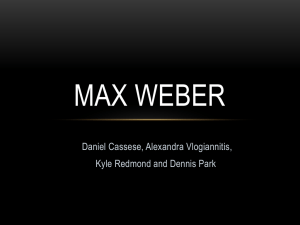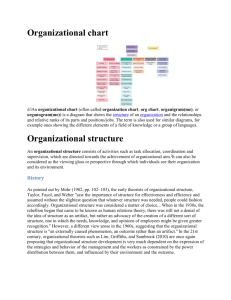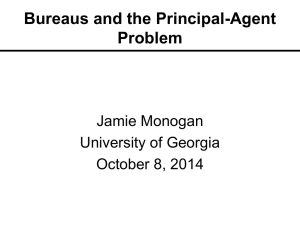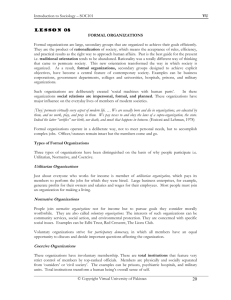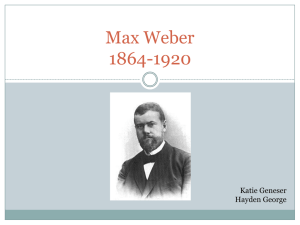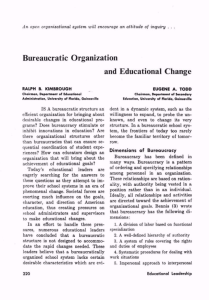Max Weber: Bureaucracy (1922)
advertisement
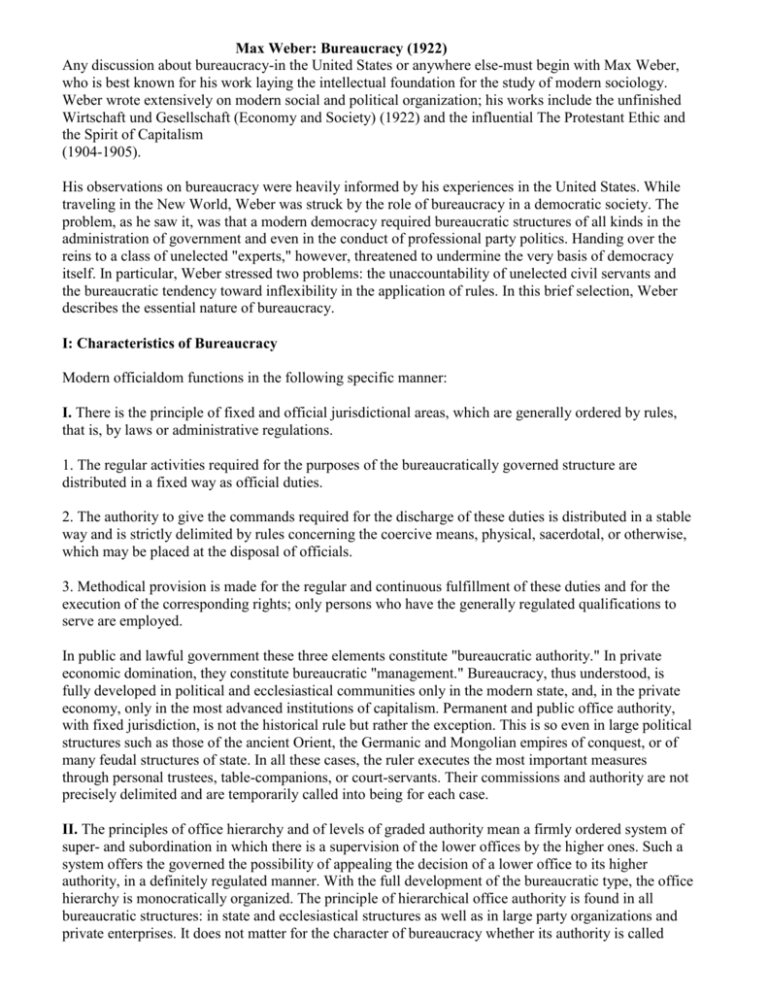
Max Weber: Bureaucracy (1922) Any discussion about bureaucracy-in the United States or anywhere else-must begin with Max Weber, who is best known for his work laying the intellectual foundation for the study of modern sociology. Weber wrote extensively on modern social and political organization; his works include the unfinished Wirtschaft und Gesellschaft (Economy and Society) (1922) and the influential The Protestant Ethic and the Spirit of Capitalism (1904-1905). His observations on bureaucracy were heavily informed by his experiences in the United States. While traveling in the New World, Weber was struck by the role of bureaucracy in a democratic society. The problem, as he saw it, was that a modern democracy required bureaucratic structures of all kinds in the administration of government and even in the conduct of professional party politics. Handing over the reins to a class of unelected "experts," however, threatened to undermine the very basis of democracy itself. In particular, Weber stressed two problems: the unaccountability of unelected civil servants and the bureaucratic tendency toward inflexibility in the application of rules. In this brief selection, Weber describes the essential nature of bureaucracy. I: Characteristics of Bureaucracy Modern officialdom functions in the following specific manner: I. There is the principle of fixed and official jurisdictional areas, which are generally ordered by rules, that is, by laws or administrative regulations. 1. The regular activities required for the purposes of the bureaucratically governed structure are distributed in a fixed way as official duties. 2. The authority to give the commands required for the discharge of these duties is distributed in a stable way and is strictly delimited by rules concerning the coercive means, physical, sacerdotal, or otherwise, which may be placed at the disposal of officials. 3. Methodical provision is made for the regular and continuous fulfillment of these duties and for the execution of the corresponding rights; only persons who have the generally regulated qualifications to serve are employed. In public and lawful government these three elements constitute "bureaucratic authority." In private economic domination, they constitute bureaucratic "management." Bureaucracy, thus understood, is fully developed in political and ecclesiastical communities only in the modern state, and, in the private economy, only in the most advanced institutions of capitalism. Permanent and public office authority, with fixed jurisdiction, is not the historical rule but rather the exception. This is so even in large political structures such as those of the ancient Orient, the Germanic and Mongolian empires of conquest, or of many feudal structures of state. In all these cases, the ruler executes the most important measures through personal trustees, table-companions, or court-servants. Their commissions and authority are not precisely delimited and are temporarily called into being for each case. II. The principles of office hierarchy and of levels of graded authority mean a firmly ordered system of super- and subordination in which there is a supervision of the lower offices by the higher ones. Such a system offers the governed the possibility of appealing the decision of a lower office to its higher authority, in a definitely regulated manner. With the full development of the bureaucratic type, the office hierarchy is monocratically organized. The principle of hierarchical office authority is found in all bureaucratic structures: in state and ecclesiastical structures as well as in large party organizations and private enterprises. It does not matter for the character of bureaucracy whether its authority is called "private" or "public." When the principle of jurisdictional "competency" is fully carried through, hierarchical subordination-at least in public office-does not mean that the "higher" authority is simply authorized to take over the business of the "lower." Indeed, the opposite is the rule. Once established and having fulfilled its task, an office tends to continue in existence and be held by another incumbent. III. The management of the modem office is based upon written documents ("the files"), which are preserved in their original or draught form. There is, therefore, a staff of subaltern officials and scribes of all sorts. The body of officials actively engaged in a "public" office, along with the respective apparatus of material implements and the files, make up a "bureau." In private enterprise, "the bureau" is often called "the office." In principle, the modern organization of the civil service separates the bureau from the private domicile of the official, and, in general, bureaucracy segregates official activity as something distinct from the sphere of private life. Public monies and equipment are divorced from the private property of the official. This condition is everywhere the product of a long development. Nowadays, it is found in public as well as in private enterprises; in the latter, the principle extends even to the leading entrepreneur. In principle, the executive office is separated from the household, business from private correspondence, and business assets from private fortunes. The more consistently the modern type of business management has been carried through the more are these separations the case. The beginnings of this process are to be found as early as the Middle Ages. It is the peculiarity of the modem entrepreneur that he conducts himself as the "first official" of his enterprise, in the very same way in which the ruler of a specifically modern bureaucratic state spoke of himself as "the first servant" of the state. The idea that the bureau activities of the state are intrinsically different in character from the management of private economic offices is a continental European notion and, by way of contrast, is totally foreign to the American way. IV. Office management, at least all specialized office management-and such management is distinctly modem-usually presupposes thorough and expert training. This increasingly holds for the modern executive and employee of private enterprises, in the same manner as it holds for the state official. V. When the office is fully developed, official activity demands the full working capacity of the official, irrespective of the fact that his obligatory time in the bureau may be firmly delimited. In the normal case, this is only the product of a long development, in the public as well as in the private office. Formerly, in all cases, the normal state of affairs was reversed: official business was discharged as a secondary activity. VI. The management of the office follows general rules, which are more or less stable, more or less exhaustive, and which can be learned. Knowledge of these rules represents a special technical learning which the officials possess. It involves jurisprudence, or administrative or business management. The reduction of modem office management to rules is deeply embedded in its very nature. The theory of modem public administration, for instance, assumes that the authority to order certain matters by decree-which has been legally granted to public authorities-does not entitle the bureau to regulate the matter by commands given for each case, but only to regulate the matter abstractly. This stands in extreme contrast to the regulation of all relationships through individual privileges and bestowals of favor, which is absolutely dominant in patrimonialism, at least in so far as such relationships are not fixed by sacred tradition.... Technical Advantages of Bureaucratic Organization The decisive reason for the advance of bureaucratic organization has always been its purely technical superiority over any other form of organization. The fully developed bureaucratic mechanism compares with other organizations exactly as does the machine with the nonmechanical modes of production. Precision, speed, unambiguity, knowledge of the files, continuity, discretion, unity, strict subordination, reduction of friction and of material and personal costs-these are raised to the optimum point in the strictly bureaucratic administration, and especially in its monocratic form. As compared with all collegiate, honorific, and avocational forms of administration, trained bureaucracy is superior on all these points. And as far as complicated tasks are concerned, paid bureaucratic work is not only more precise but, in the last analysis, it is often cheaper than even formally unremunerated honorific service. Honorific arrangements make administrative work an avocation and, for this reason alone, honorific service normally functions more slowly; being less bound to schemata and being more formless. Hence it is less precise and less unified than bureaucratic work because it is less dependent upon superiors and because the establishment and exploitation of the apparatus of subordinate officials and filing services are almost unavoidably less economical. Honorific service is less continuous than bureaucratic and frequently quite expensive. This is especially the case if one thinks not only of the money costs to the public treasury-costs which bureaucratic administration, in comparison with administration by notables, usually substantially increases-but also of the frequent economic losses of the governed caused by delays and lack of precision. The possibility of administration by notables normally and permanently exists only where official management can be satisfactorily discharged as an avocation. With the qualitative increase of tasks the administration has to face, administration by notables reaches its limitstoday, even in England. Work organized by collegiate bodies causes friction and delay and requires compromises between colliding interests and views. The administration, therefore, runs less precisely and is more independent of superiors; hence, it is less unified and slower. All advances of the Prussian administrative organization have been and will in the future be advances of the bureaucratic, and especially of the monocratic, principle. Today, it is primarily the capitalist market economy which demands that the official business of the administration be discharged precisely, unambiguously, continuously, and with as much speed as possible. Normally, the very large, modem capitalist enterprises are themselves unequalled models of strict bureaucratic organization. Business management throughout rests on increasing precision, steadiness, and, above all, the speed of operations. This, in turn, is determined by the peculiar nature of the modern means of communication, including, among ~other things, the news service of the press. The extraordinary increase in the speed by which public announcements, as well as economic and political facts, are transmitted exerts a steady and sharp pressure in the direction of speeding up the tempo of administrative reaction towards various situations. The optimum of such reaction time is normally attained only by a strictly bureaucratic organization. Bureaucratization offers above all the optimum possibility for carrying through the principle of specializing administrative functions according to purely objective considerations. Individual performances are allocated to functionaries who have specialized training and who by constant practice learn more and more. The "objective" discharge of business primarily means a discharge of business according to calculable rules and "without regard for persons. "Without regard for persons" is also the watchword of the "market" and, in general, of all pursuits of naked economic interests. A consistent execution of bureaucratic domination means the leveling of status "honor." Hence, if the principle of the free-market is not at the same time restricted, it means the universal domination of the class situation." That this consequence of bureaucratic domination has not set in everywhere, parallel to the extent of bureaucratization, is due to the differences among possible principles by which polities may meet their demands. The second element mentioned, "calculable rules," also is of paramount importance for modern bureaucracy. The peculiarity of modern culture, and specifically of its technical and economic basis, demands this very "calculability" of results. … [The] specific nature [of bureaucracy], which is welcomed by capitalism, develops the more perfectly the more the bureaucracy is "dehumanized," the more completely it succeeds in eliminating from official business love, hatred, and all purely -personal, irrational, and emotional elements which escape calculation. This is the specific nature of bureaucracy and it is appraised as its special virtue. The more complicated and specialized modern culture becomes, the more its external supporting apparatus demands the personally detached and strictly "objective" expert, in lieu of the master of older social structures, who was moved by personal sympathy and favor, by grace and gratitude. Bureaucracy offers the attitudes demanded by the external apparatus of modern culture in the most favorable combination. As a rule, only bureaucracy has established the foundation for the administration of a rational law conceptually systematized on the basis of such enactments as the latter Roman imperial period first created with a high degree of -technical perfection. During the Middle Ages, this law was received along with the bureaucratization of legal administration, that is to say, with the displacement I of the old trial procedure which was bound to tradition or to irrational presuppositions, by the rationally trained and specialized expert. Questions to think about 1. What are the characteristics of the bureaucratic form of governmental power? What are bureaucracy's strong points? weak points? 2. Why are the rules so important in a bureaucracy? What are the advantages and disadvantages of making decisions on the basis of general rules, rather than on a case-by-case basis?
